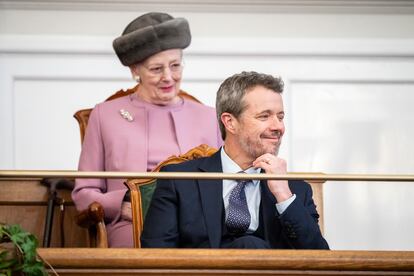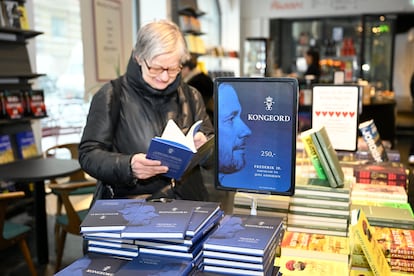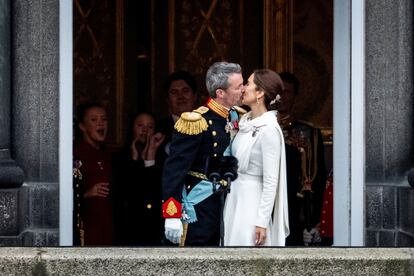Frederick X of Denmark begins his reign with a surprise book in which he shares his vision of the tasks ahead and reflects on his youth
The new king came to rule after the abdication of his mother, Margaret II, who spent 52 years on the throne. The tome reflects his evolution, from his doubts as a teenager and his discomfort as a young man about his royal destiny to his seeming calm about his new status as sovereign


Frederick X, the new king of Denmark, is beginning his reign with a book entitled Kongeord (The Word of a King), published on Wednesday, January 17. In it, he offers a vision of his tasks and reflects on his youth. At the age of 55, the first-born son of Margrethe II —who officially abdicated last Sunday in Copenhagen— has surprised his compatriots by sharing his desires and concerns about the future. Although the book’s appearance was kept secret until the very day of its publication, Danish media report that the publisher has been very busy since New Year’s Eve, when the queen announced her retirement after 52 years on the throne. While we do not know how long the book was in the works, it has been just three days since Frederick X went onto the Danish Parliament’s balcony as the new king, with his wife Queen consort Mary at his side, to be celebrated by his fellow citizens.
On Wednesday, the Danish daily Jyllands-Posten, the largest of Denmark’s daily newspapers, described the appearance of the book, published by Politikens Forlag, as a “great surprise.” It explained that the publication “reflects the young and recalcitrant crown prince’s path” to becoming “a mature man, a family man, and king.” The royal family’s website, which has been revamped since Frederick X became king, introduces the book, noting that “the King himself [explains] what he means by the words ‘United, committed, for the kingdom of Denmark.’” That is the motto of his reign; it does not expressly mention God, as is traditional in the Danish monarchy.
Last Sunday, addressing the Danish people as monarch, Frederick X invoked the support of his “dear wife,” his family, and “you and of that which is greater than all of us.” Since Danish monarchs are heads of both the state and the Evangelical Lutheran Church, the royal family has sought to clear up doubts about the matter. To that end, its website includes some of the king’s statements, which illustrate his apparent omission of the divine. One such phrase is that “the strength of faith lies not in whether God is mentioned in the word of a king, but in the fact that we, as people, feel connected to each other through our Christian faith.” Of his Christianity, Fredrick X says in his book that “it occupies much more of my life than it used to.” 72 percent of the population is recorded as members of the Evangelical Lutheran Church, which has 55% women priests. However, according to the Ministry of Foreign Affairs’ official website, less than 5% of Danes consider themselves to be very religious.
The book was written by Jens Andersen, a Danish author who already published a 2018 biography of the then crown prince. This time, his portrait of the new monarch reflects the king’s evolution, from his doubts as a teenager and his discomfort as a young man in the face of his royal destiny to ultimately ascending to the throne with apparent calm. “I just wanted to be like other boys my age, and for many years calling myself King was something I did not want at all,” Frederick X admits to the writer. The son of Queen Margrethe and the late Prince Henry came to believe that turning 18 “was something like the end of the world because everything fun and enjoyable would come to an end.” But, he acknowledges, “fortunately, it didn’t.” During his youth, he earned the nickname Turbo, for his penchant for driving at high speed. His tendency to party was similarly evident.

Frederick X says that he owes his sense of duty to his mother and his wife. He adds that “for once, I am the person I want to be. I will also strive to develop that as King of Denmark”; the Danish royal family’s website highlighted that same phrase. Of his wife, the Australian-born queen consort — with whom he will celebrate 20 years of marriage next May — the new king says that she is his “co-pilot” and that they have a “super dynamic together,” In the weeks prior to the announcement of Margrethe II’s abdication, the Danish tabloid press reported the then-prince’s visit to Spain to meet Genoveva Casanova, the former daughter-in-law of the Duchess of Alba. The Danish royal family did not comment on the photos published by the Spanish magazine Lecturas [Readings].

Represented by Frederick X and Mary of Denmark, the monarchy’s new era will be shaped by their attention to environmental issues, “because we wish to contribute to leaving the planet in good condition for the next generation.” To that end, they intend to “support initiatives for nature conservation, biodiversity and the fight against climate change.” That pledge to personally take action is summarized elsewhere in the book: “In many Western societies the important question is: What can you do for me? Rarely is it the other way around: What can I do for you?”
In the extensive photo gallery of the proclamation provided by the royal household, there are pictures of the thousands of Danes who filled the streets of Copenhagen to greet an emotional Frederick X. There are also images of the royal couple holding hands around the waist on the balcony of the Danish Parliament. In the video of the speech delivered from the balcony, we can see the kiss the royal couple shared at the end.
Sign up for our weekly newsletter to get more English-language news coverage from EL PAÍS USA Edition
Tu suscripción se está usando en otro dispositivo
¿Quieres añadir otro usuario a tu suscripción?
Si continúas leyendo en este dispositivo, no se podrá leer en el otro.
FlechaTu suscripción se está usando en otro dispositivo y solo puedes acceder a EL PAÍS desde un dispositivo a la vez.
Si quieres compartir tu cuenta, cambia tu suscripción a la modalidad Premium, así podrás añadir otro usuario. Cada uno accederá con su propia cuenta de email, lo que os permitirá personalizar vuestra experiencia en EL PAÍS.
¿Tienes una suscripción de empresa? Accede aquí para contratar más cuentas.
En el caso de no saber quién está usando tu cuenta, te recomendamos cambiar tu contraseña aquí.
Si decides continuar compartiendo tu cuenta, este mensaje se mostrará en tu dispositivo y en el de la otra persona que está usando tu cuenta de forma indefinida, afectando a tu experiencia de lectura. Puedes consultar aquí los términos y condiciones de la suscripción digital.








































